Spokane Blog
Prayer for Syria and Turkey After Devastating Earthquakes
Join World Relief Spokane in lifting up a prayer for Syria and Turkey. On February 6, 2023, two earthquakes caused enormous destruction. Currently, thousands of people have died and many thousands more are injured or missing. The process of rebuilding homes, businesses, and lives will take many years.
Within our community at World Relief Spokane, this tragedy feels very close to home. One of our staff lived in Turkey for nine years and went to school there. She has friends and family members still living in the region and just visited over Christmas break. We also serve refugees and immigrants who came to the U.S. from Syria and Turkey, leaving loved ones behind.
We know that many of those impacted are among the most vulnerable – some are refugees who fled Syria for Turkey while others are persecuted minority groups or those in poverty.
Recovering from this devastation will be very difficult.
As our community grieves, we invite you to join us in prayer for Syria and Turkey. Thank you for joining World Relief Spokane in asking God to bring an end to suffering and a reign of justice on the earth.
PRAYER FOR SYRIA AND TURKEY
God,
In the face of unspeakable tragedy, the suffering of those in our community, and the destruction and loss of life in Syria and Turkey, we pray what the Psalmist wrote in Psalm 10:
Lord, you know the hopes of the helpless. Surely, you will hear their cries and comfort them. You will bring justice to the orphans and the oppressed.
Comfort the people whose family members and friends have died as a result of these earthquakes. Draw close to them.
Equip believers in Syria and Turkey to show the love of Jesus to their neighbors by helping in tangible ways and sharing the hope of the Gospel.
Inspire generosity in the hearts of people in the United States and across the world, prompting individuals to give the resources and money needed to help communities rebuild.
Empower the Church in America to show radical love for our immediate neighbors who are grieving the loss of life, beauty, and peace in Syria and Turkey.
Let us not turn away, but help us be your hands and feet to love those who are suffering and bear witness to your presence with them.
God, hear our prayer.
Amen.
You Can Help
World Relief is responding to provide immediate assistance through our network of long-standing partners and churches in the region. You can help reach more people in need by responding with us today. Give now to rush help to Turkey and Syria.
Read a press release from World Relief regarding the earthquakes on February 6, 2023.
Jeanine’s Story
By Lisa Zanoni, World Relief Relationship Manager
Editor’s Note: Over the next several months, Lisa will be introducing you to some of our amazing refugee and immigrant friends. Everyone you’ll meet is either a former refugee or a client who received services at World Relief. Lisa is excited to share their stories with you and hopes that you will be both inspired by their resilience and encouraged to know your partnership with World Relief Spokane has made such an impact on their lives.
“They came to our house and took my dad. We heard rumors about what happened to him, but we never really knew the truth.”
When you see Jeanine for the first time, you are struck by her appearance. Tall, poised, and well-dressed, you wouldn’t know by looking at her that her childhood years were filled with seemingly impossible challenges and life-altering, even hopeless circumstances.
As we talked, Jeanine’s internal qualities of perseverance, resilience and determination were revealed, outshining her stunning, external beauty. Born in the Democratic Republic of Congo, Jeanine and her family were forced to flee after her father was abducted from their home and murdered. The decision to leave was a difficult one for her mother. But leave they did, and the place they called home for the next five years was a refugee camp in Rwanda.
Jeanine felt fortunate only to have to live five years in the camp. Her aunt and cousins were already living there and stayed for 12 years. Some of her cousins were born there, and “this was the only life they knew how to live.”
Jeanine is passionate about education, and as she recalls the education system in the camp, her eyes are glistening with tears. “Life was difficult in the camp. There was no way to go to school. Different people wanted to do something to help these children, so that they’re not sitting home all day. My mom started a little school system, and there was no place for us to learn. It was hot there and no rain. We would sit under the trees with no access to water. We had to walk miles to go get water.”
Once the children reached 6th grade, they were able to study outside the camp with other Rwandese children. Upon reaching ninth grade, they were given an exam. If they were lucky and had the scores required for continuing their education, they would qualify for a scholarship to attend a school outside the camp. “But if you don’t have the highest scores, there was no opportunity to go to school.” Paying for education was also an option. Unfortunately, there was no way to earn a viable living inside the camp, and this ultimately meant that most of the children were not able to continue their education. UNICEF and UNHCR would provide materials for learning, but there was no money provided for scholarships.
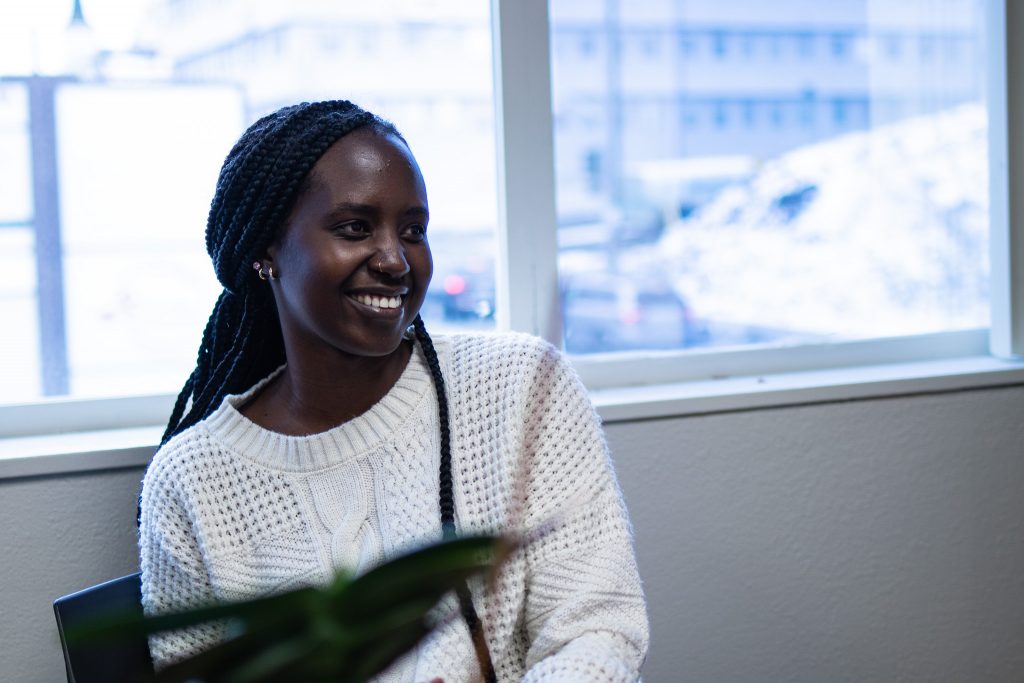
I asked Jeanine if she felt prepared to enter into the public school system when she arrived in Spokane. Bellowing with laughter, she admitted, “Oh no! I was excited!” She continued, “My whole hope was that I could actually go to school here and have something for myself.”
At the beginning of their journey as refugees, Jeanine and her mother never had any hope or expectation that they would come to America. Their hope was to return home, hoping that their country would be safe enough for them to return. Personal and precious belongings were left behind but not abandoned in their hearts. They never gave up the hope that they would someday return home. Eventually, her mother, “the decision-maker,” made the decision to pursue a life apart from their home in Rwanda. Wanting to provide a life of hope and opportunity for her family, she chose a new life in a new country.
Her mother, a kindergarten teacher and pioneer educator in the camp, instilled in Jeanine a love of learning. Love and respect combined with gratitude and awe for her mother, were catalysts for Jeanine to pursue her education. Not something to be debated, she reflected, “I always hoped to God that if I ever got the opportunity, I would do that. I would keep going. Even with my student loans, I am grateful. God is good. I am thankful I am here in this moment in time.”
In contrast to her early years, Jeanine’s successes since coming to America have been overwhelming. Not only did she and her mother become United States citizens, upon graduating from Ferris High School, Jeanine received her Bachelor’s degree in Communications, and her Master’s degree in Social Work, both from EWU. She has been working alongside us at World Relief Spokane for the past four years, selflessly giving back and lovingly serving refugees. She recently received a promotion and will oversee one of the US programs for World Relief’s headquarters.
As our conversation came to a close, I half-jokingly asked Jeanine if we could plan on seeing “The Jeanine Kayetsi Scholarship Fund” for helping those children remaining in the camps sometime in the near future. Her answer left me feeling challenged. In a positive way. She agreed that a scholarship fund would be great, and she affirmed what we already know in our hearts. Any help would be welcomed for the children in the camps. Funding for education, hygiene products for the girls. “If something magical would happen, maybe I could do that.”
I don’t believe Jeanine needs magic. Jeanine is magic.
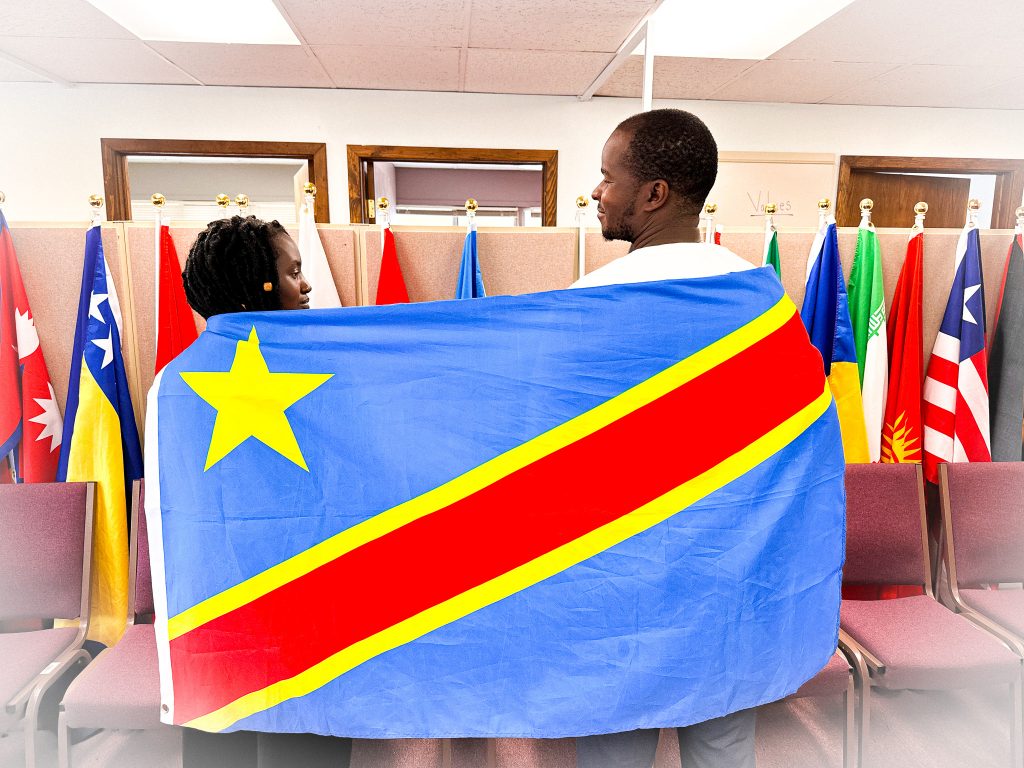
Jesus Didn’t Show Favoritism
Rich Versus Poor
During his short time of public ministry, Jesus was busy. Crowds of 5,000 plus gathered to hear him teach. People brought their sick to be healed, even tearing apart roofs to lower the lame at his feet. People pursued him from one shore to another, trying to anticipate where he would go. He only had three years in which to change the world. Surely, it would make sense for him to speak to the most influential people and make the most efficient use of his time. His disciples seemed to think so. They turned away parents seeking to bring their children. The crowds rebuked the blind man who was calling out to Jesus. With so little time, wouldn’t it make sense for Jesus to be selective about the people with whom he engaged?
But that doesn’t appear to be what he did.
Look at the end of Luke chapter 8. A leader in the synagogue – a powerful, influential man – comes to Jesus to say that his daughter of 12 is very ill. Wouldn’t healing this young woman be a way for Jesus to get in good with the religious leaders? Shouldn’t this be his priority?
Jesus agrees to go and begins to make his way there, but along the way, a woman in the crowd, a woman who has been bleeding for 12 years and has exhausted all her resources trying to find help, reaches out to touch him. The text says she had spent all she had with doctors who only made things worse, so she was poor. On top of that, a woman who was bleeding continually would be considered unclean, an outcast. She had nothing to offer Jesus. And, yet, Jesus not only healed her (“he realized that power had gone out from him he wanted to meet her.”) He stopped in the midst of a large crowd and asked, “Who touched me?” Realizing what had happened, she fell at his feet and told him the whole truth. He healed her. He saw her. He listened to her.
After this delay, friends of the synagogue leader, Jairus, come to tell him it’s too late. His daughter has died. But Jesus says, “Don’t be afraid. Just believe.” He tells the mourners at the house to leave, takes the girl by the hand and says to her, “Arise.”
Jesus did not show favoritism to Jairus, the man with power and wealth, but neither does he scorn him. To the outcast woman and to the religious leader, he gives freely and fully of his time and attention.
“You must not show special favor to poor people or great people,
but be fair when you judge your neighbor” ( Lev. 19:15).
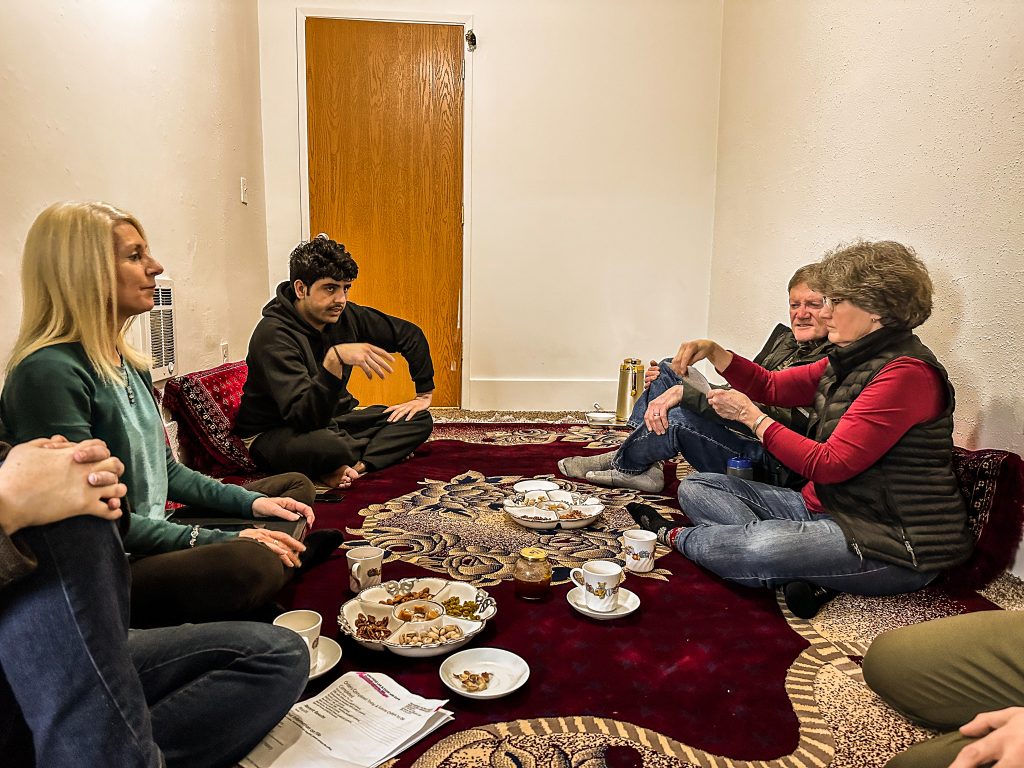
From left to right: Janice, Abbas, Blair and Susan sit in the tea room of Abbas’ third floor apartment hosting his new English Conversation Partners. Afghan’s have an uncanny sense of hospitality which they extend to every person who enter their homes.
Enemies & Strangers
In John chapter 4, Jesus has a long conversation with a Samaritan woman. At the time of Jesus, the Israelites hated Samaritans and called them “dogs” or “half-breeds.” The enmity between the two groups was deep and long-standing, dating back to the time of King Rehoboam (Solomon’s son) and the split between the northern kingdom and the southern kingdom. At the time of the split, the northern kingdom ceased to worship in Jerusalem. They built their own temple in the north. After the northern kingdom was conquered by the Assyrians, the Jews and the Assyrians intermarried and many began to worship the Assyrians’ gods alongside the Jewish God.
Later, the people of the southern kingdom were also carried off to Babylon, and when they returned, many Samaritans opposed them. In other words, they had lots of reasons to hate each other. They no longer considered themselves brothers but enemies.
And, yet, Jesus speaks to the Samaritan woman at the well. Again, he sees her, he knows her and he reveals himself to her, so that she might have living water, so that she might become a child of God.
Jesus again breaks down barriers when he tells the story of the Good Samaritan. An expert in the law wanted to test Jesus, and so he asked him, “What must I do to inherit eternal life?” Jesus replies with a question: “What is written in the law?” The man quotes from Deuteronomy and Leviticus: “Love the Lord your God with all your heart and with all your soul and with all your strength and with all your mind’; and, ‘Love your neighbor as yourself.’”
Jesus says he has answered well. This is true, but then the man asks, “Who is my neighbor?” The Bible says the man wanted to justify himself. He wanted to find a loophole or a rationale that would make him look good.
Jesus then tells the story of the Good Samaritan. His audience would have been expecting a Jew to be the hero of the story, rescuing the man who was beaten and left to die, but much to their consternation, Jesus makes a Samaritan the hero of the story.
At the end of the story, Jesus asks, “Which of these three do you think was a neighbor to the man who fell into the hands of robbers?’
And the man replies, “The one who had mercy on him.”
Jesus told him, “Go and do likewise.”
Questions to ponder:
- Are you more likely to show favoritism to the rich or to the poor?
- Who might Jesus use as the hero of the story in the Good Samaritan today?
It’s The Right thing To Do
If each one of us reflects on our own stories, we can see God clearly leading and moving in our lives. As I reflect on my own story, I see that I started out focused solely on myself. But then I met the Holy Spirit, and God became real to me. I made a firm decision to follow Him with my life. Then during my college years, I went on a mission trip with Global Outreaches Unlimited because I thought it would be fun. Well, it was fun, but it also changed the direction of my life. My heart for other cultures grew. When my graduate degree in Intercultural Studies required me to do an internship and my top choice fell through, I was placed with World Relief.
As the humanitarian arm of the National Association of Evangelicals, World Relief is an international Christian nonprofit organization with a mission to “empower the local church to serve the most vulnerable.” In the United States we work primarily with refugee resettlement and immigration services. I was amazed that there was an organization that loved two things I loved: the Church and the immigrant. I spent a year learning about World Relief’s ministry to refugees, much of it from refugees themselves. After my internship, I was hired in Spokane, Washington, as a refugee resettlement case manager where I’ve served for the past ten years.
Now that you’ve heard my story, let me tell you a story of one of my refugee friends. Shortly after he was born, his family fled to a neighboring country to escape state-sanctioned infanticide. Though they were told to leave by someone they trusted, they also fled out of fear that their son would be killed. You know this refugee too. His name is Jesus.
When refugees hear Jesus’ story, that He was also persecuted and made to flee to a different country much as they were, they feel known. They realize He understands what they are going through. He has experienced what they are experiencing.
For years a church here in Spokane has hosted a “First Christmas” event for newly arrived refugees. The church throws a party with food and toys for the kids and also shares Jesus’ story. It’s cool to hear about the moments when these newcomers realize that Jesus understands them because He was one of them.
“It’s cool to hear about the moments when these newcomers realize that Jesus understands them because He was one of them.”
Jordan bemis
Each of these refugees has a story to tell. Every story is different, yet every story is similar. The struggles they face are not just the fear and the fleeing; the struggle is also with identity. I have heard over and over again that a refugee doesn’t know who they are. People in their native country didn’t want them and in fact may have tried to kill them. Neither did they have rights in neighboring countries to which they fled. They were not allowed to work, and in many cases, kids were not able to attend school. They were forced to simply wait.
Refugees will tell you that this waiting until someone wanted them was the hardest part of their journey. I know many who had to wait ten, fifteen, even twenty years. I know adults in their twenties who were born in refugee camps; it is the only life they have known.
The average wait for a refugee is seven years. That is a long time to not know how you fit in the world. Can you imagine how hard that wait would be on you mentally, emotionally, and physically?
GOD IS DRAWING THE NATIONS
One of our family’s favorite verses is Isaiah 55:5 (NIV):
Surely you will summon nations you know not, and nations you do not know will come running to you, because of the Lord your God, the Holy One of Israel, for he has endowed you with splendor.
It is God who moves people. It is God who has allowed these refugees to come here. In the process He is drawing them and us to Him. Today there are 27.1 million refugees in the world registered with UNHCR (United Nations High Commissioner for Refugees). On average, only half of one percent of those are resettled to a new country each year. Since I started working at World Relief Spokane in 2012, our office has received 2,401 refugees. That’s a lot of midnight airport pick-ups, home visits, grocery shopping, and enrolling kids in school! But those are just the tasks I am required to do because they are part of my job. It is their stories and the relationships that have impacted our community and me the most.
When I began, one of my first cases was a mom from Afghanistan with four young boys. I spent a lot of time at their apartment because the landlord kept calling me with complaints such as the boys running around breaking off sprinkler heads and making messes in the laundry room. I’d drive to their place, spend time with them, and wonder how they were going to be okay. It was hard for them, but through relationships they built with us and with the community, they got settled and were able to grow and learn.
“The average wait for a refugee is seven years. That is a long time to not know how you fit in the world. Can you imagine how hard that wait would be on you mentally, emotionally, and physically?“
jordan bemis
After five years, I was privileged to see them become citizens of the United States. Now ten years later, those boys are succeeding in college, graduating, and beginning successful careers. One of the boys even joined our staff for a while. Just how far they’ve come since they first arrived to where they are now shows God’s hand on their lives.
There are many misconceptions about refugees, but actual statistics prove that, as in the case of the Afghan family, most eventually benefit their new communities. After the initial investment where we help them find housing and their first jobs, connect them to English classes and volunteers, and help them access healthcare they end up contributing in many ways. They start businesses that employ local people at a faster rate than native born Americans, they help stimulate the economy, and they are willing to do hard, physically demanding work that native citizens might not want to do. Those are just some of the financial benefits. Refugees add value to their new communities in so many other ways as well.
I was recently speaking to a high school group about the subject of refugees, sharing stats about how refugees add value to the United States. I shared that within twenty years of settling here, the amount refugees pay in taxes more than makes up for what it cost the United States to resettle them. I was trying desperately to make a case about why we should help refugees when a girl in the front raised her hand. She said, “Well, all of that doesn’t really matter, does it, because isn’t it just the right thing to do?”
I was speechless, hearing someone so young express truth a whole lot better than I was. Helping refugees is the right thing to do. Micah 6:8 says, “And what does the Lord require of you? To act justly and to love mercy and to walk humbly with your God.” We should minister and partner with the refugee because it is God who is at work in both them and us, and He is wanting us to partner with Him in His mission. It is God who is drawing refugees and us to Him.
It’s the incarnation of Jesus we hear about in the Christmas story that allows everyone, especially refugees, to relate to and know Him. And it is Christ in us through the Holy Spirit who gives us the courage to cross cultures, languages, and religions and to build relationships with refugees. This is a reciprocal relationship, where both the Church and refugees mutually learn from each other. We are blessed by one another as we are both drawn to Jesus.
So how can you make a difference in the life of a refugee?
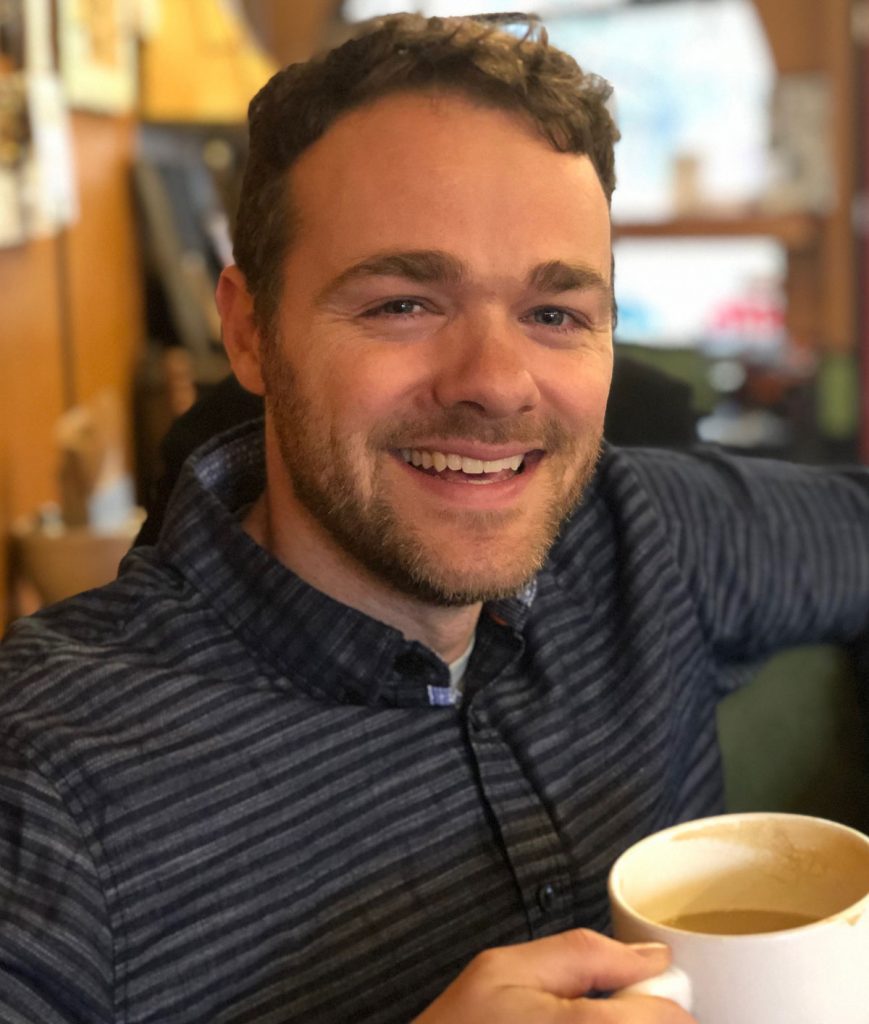
Jordan Bemis is the Resettlement Director at World Relief, where he has worked for ten years. He and his wife, Hannah, have three kids, Asher, Nora, and Abel, and serve at Turning Point Open Bible Church in Spokane, Washington. The family recently adopted a puppy named Maverick.
Please Note: This article was originally published in the Message of the Open Bible.
Welcome Home, Rezvan!
Until she came to the United States in 2019, Rezvan had been a refugee for her entire life.
She considers Afghanistan to be her home country, but she was born in Iran and grew up in Turkey.
“Our whole lives were like moving from city to city or from country to country.”
Rezvan’s mother and father fled Afghanistan to Iran during the Soviet-Afghan war.
After Rezvan’s father died in Iran, her mother decided to move the family to Turkey to protect her daughters and provide them with more opportunities.
“My father died in Iran, and then, after my father died, we decided to move from Iran to Turkey because all of us were young, and my mom [wanted to protect us].” Rezvan’s mother wanted a better life for her daughters than what she could foresee in Iran or Afghanistan.
Devastation After The Fall
According to the Human Rights Watch, “Taliban rule has had a devastating impact on Afghan women and girls.” The Taliban has created barriers to women’s health and education and curtailed their freedom of movement and expression. While Taliban rule is new since the fall of Kabul one year ago, many of these Taliban abuses were already present throughout the country years before.
According to UNICEF, child marriage is also on the rise in Afghanistan.
We have received credible reports of families offering daughters as young as 20 days old up for future marriage in return for a dowry.
Even before the latest political instability, UNICEF’s partners registered 183 child marriages and 10 cases of selling of children over 2018 and 2019 in Herat and Baghdis provinces alone. The children were between 6 months and 17 years of age.
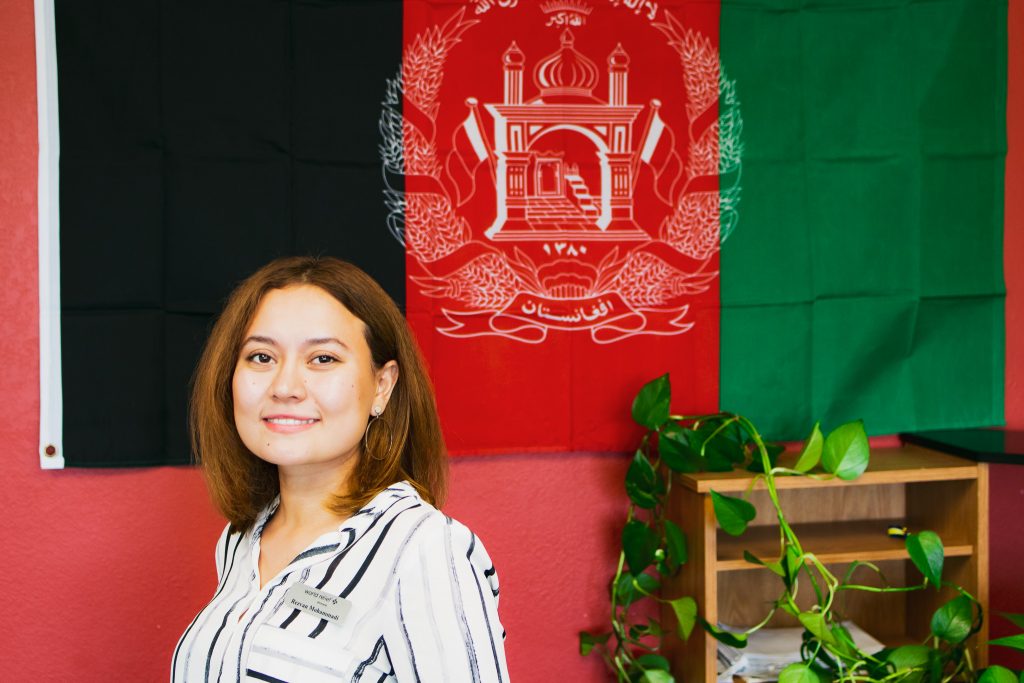
UNICEF estimates that 28 per cent of Afghan women aged 15–49 years were married before the age of 18. (unicef.org)
Rezvan and her family lived in Turkey for 8 years, from the time Rezvan was 14 until she was 22. She finished high school and college there.
“When I was in Turkey, I had some friends from Italy. They are my second mom and dad. They support me a lot. They worked in Turkey with refugees for 25 years. They taught me how to help people. I decided to help refugees in Turkey, and then I taught Turkish language to refugees for five years.”
Rezvan speaks Persian (called Dari when spoken in Afghanistan), Turkish, and as she says, “English a little bit, and I can understand a little bit of Arabic.”
Rezvan’s sister came to the US five years before Rezvan and her mom, and her sister connected Rezvan to World Relief while she was still in Turkey. “They helped us a lot. They gave us a caseworker. Now, I am a caseworker.” Rezvan’s experiences have created within her a strong desire to give back. She knows how important it is to meet a friendly face, to have someone to walk alongside you.
Working in Heaven
“World Relief is like heaven. When you come inside World Relief, when you see the people’s faces in World Relief, you can see kindness in their heart.”
Rezvan now serves refugees during their first 90 days of arrival in the US. She welcomes them at the airport, helps them bridge the language barrier and connect with resources. In connection with her teammates, she helps them find housing and employment and enroll their children in school, as well as navigating public transportation, shopping and all the other details of daily life.
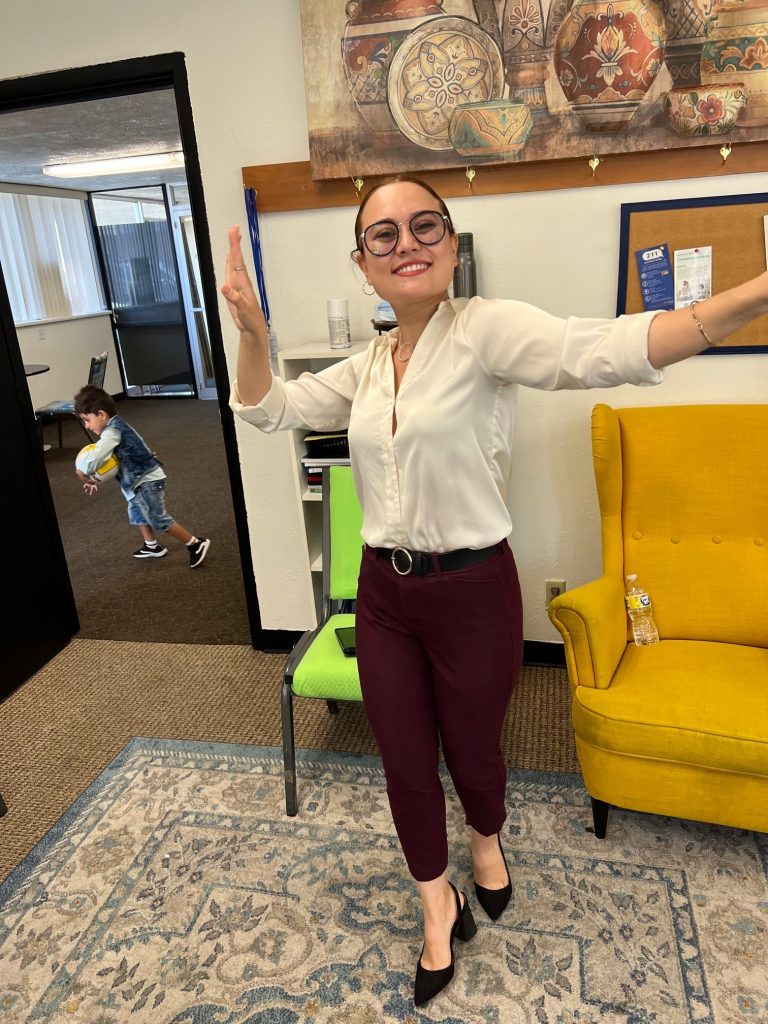
“You know, because I spent all my life as a refugee, so when I see a refugee come here, I see myself and my family. We had a hard life. I don’t want the refugees when the come here… I want them to have a good life here. I want to help them like those two people that taught me how to help people.
“Those are my beautiful lessons in my life.
“When I help people, I feel something. It’s hard to describe… Before, when I came to World Relief, I thought maybe I had a heavy thing on my back, but when you help people, you are just like…free. It’s like something is going to be free from your body. When I am here, I feel very, very well.”
Anzhella’s Story: Do Unto Others
“My mom was so grateful. Even for the littlest things, she would say, ‘Thank you God!’ She would appreciate everything.”
Anzhella (she goes by Angela here in the United States because people often have trouble pronouncing her given name correctly) came to the US when she was six years old. In addition to a twin sister, her parents had three more children at the time, and her mom was pregnant with her second pair of twins. After their arrival and before World Relief set them up with housing, they all lived at her grandparents’ house, along with a variety of other relatives who had arrived in the US.
“One huge family at my grandma’s house.” Her overwhelming memory of that time, however, is not chaos, but joy.
“When we got here in 2000, my parents were the happiest people in the world. There was a huge group of people at the airport to greet us. We could go to school, have religious freedom, and opportunities. My parents were excited to make that happen for us because there wasn’t much future for us in Ukraine.”

Angela and her family came from the Ukraine through the Lautenberg Program, a special program created in 1990 to allow family members currently in the US to bring their relatives from the former Soviet Union to resettle in the US as refugees. The program, which focuses on freedom from religious persecution, is still in effect today. It closes every year on September 30 and must be re-approved on an annual basis.
Angela said her family arrived with very little. “World Relief gave us furniture and clothing. Clothing was huge for us because we didn’t have the right clothes for the season when we arrived. They set us up with housing and connected us to Habitat for Humanity so that we could build our first house in the US; a place we can truly call home.”
A New Community
Perhaps the biggest gift, however, was that World Relief connected Angela’s family with a case manager, Alla Derevenchuk, who in turn connected Angela’s family with a school Support Specialist, Sandi Solverson, who became a lifelong friend. “It was a perfect match.” Like Angela and her two little brothers, Sandi was also a twin and connected quickly with the family. Angela’s mom was so grateful to have someone she could call to help navigate life in this country. Sandi would notice what the family lacked, and she would help them acquire those things by connecting them with available resources. “She always set us up with resources like the Christmas Bureau, back-to-school supplies, vouchers for shoes, and so much more! We still keep in touch.” Sandy came to her sisters’ weddings among other events. “She was someone my mom trusted, and that gave her peace of mind during the chaos of resettlement.
“My parents’ goal was to work hard and make a better life for us; so that we had the opportunity to get an education and good jobs instead of ‘toiling in the sun’ the way they did.” Her parents both worked and went to school to learn English. After about five years, her father, who is an entrepreneur, started his own trucking company. “When the market crashed and the business closed, he didn’t give up there. He opened up an adult family home which has been running for 12 years now.”
Joining the Team
After getting her Bachelor’s degree in social work, Angela came to work for World Relief. As the Initial Healthcare Coordinator, she makes certain that new arrivals are set up with health insurance. She navigates the Washington Health Plan Finder for health insurance, secures a State ID card for each person and coordinates refugee health screenings. For pregnant women and moms with young children, she makes sure they get set up with WIC. And for elderly patients, she helps them apply for SSI.
“I didn’t know how hard it can be to coordinate so many different areas of a person’s life.”
Angela does all of her work behind the scenes before a family arrives – reading their medical records, researching their needs, and coordinating with healthcare providers for a smooth transition into the US healthcare system. “I want to be prepared ahead of time so that families receive the care they desperately need right away.”
Angela said one of her favorite Bible verses is Matthew 7:12, the golden rule: “Do unto others as you would have them do unto you.”
“When I meet new immigrants and refugees, I want to give them everything I can so they can succeed.”
When I asked Angela what made her want to do this work, she referred again to her mom: “I remember hearing how thankful my mom was for all the resources. We wouldn’t have been able to get to where we are today without those, and that’s why I wanted to help others. Nothing makes me happier. My mom had that happiness when she helped other people who came here after us, and my dad when he gave driving lessons to newcomers. Being able to give instead of just receiving brought us great joy.”
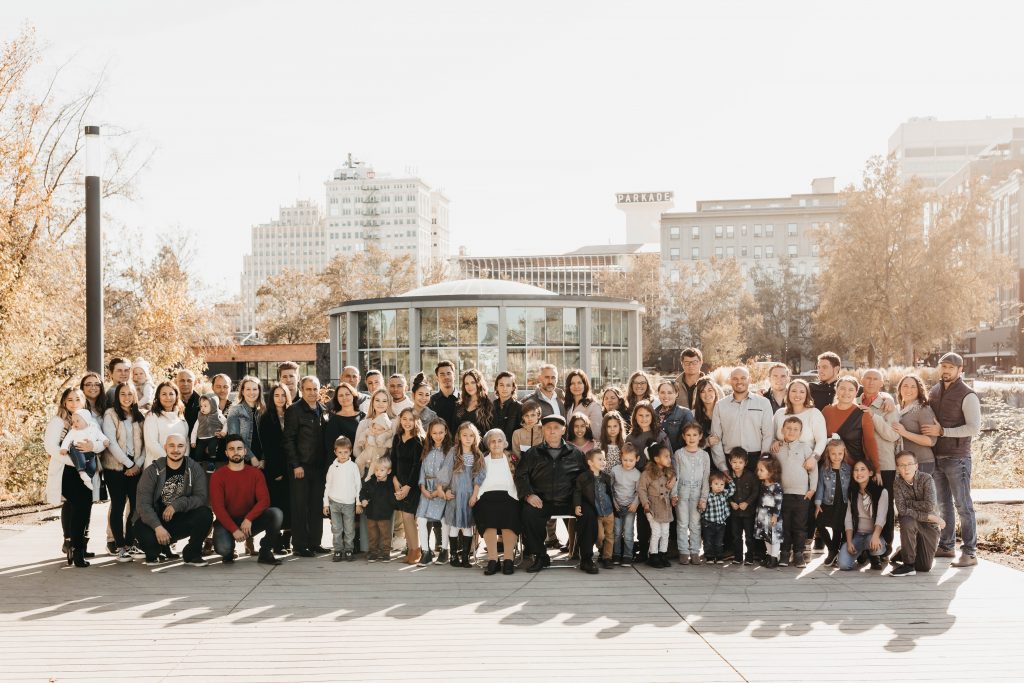
Family is still a binding force in Angela’s life. “Nobody in our family is going to forsake one another. We’ll always be there for each other.”
In fact, every Sunday, they gather together. It used to be at her grandma’s house, and now, Sunday dinner is at her mom’s house. Stuffed peppers, garbanzo bean soup and plachinte, a cottage cheese pastry, are just a few of the favorites. Here’s a recipe for you to try from Angela’s family.
Garbanzo Bean Soup
Ingredients
1 cup Garbanzo Beans (also known as chickpeas)
3 cups of homemade chicken broth
1 onion (chopped into cubes)
1-2 tablespoons cooking oil
1/4 teaspoon of crushed chipotle pepper (or less)
1/4 teaspoon of salt
1 teaspoon of dried dill
Instructions:
- Soak 1 cup garbanzo beans in 3 cups of lukewarm water overnight. Before cooking, throw away the water from the garbanzo beans.
- Add garbanzo beans to room temperature chicken broth. Bring to a boil. (The temperature of the chicken broth should be room temperature to avoid hardening of the beans.) Once it begins to boil, reduce heat to a simmer. Simmer for 1 ½ to 2 hours (until tender).
- While beans are simmering, chop 1 large onion into cubes. Add 2 tablespoons of oil into a frying pan and sauté the onion on medium-low heat. If desired, add 2-3 cloves of minced garlic. Once onion is almost ready, add 1-2 teaspoons of Smoked Paprika (or regular paprika if you don’t have smoked) and 1/4 teaspoon of crushed chipotle pepper (or just a pinch for flavor) and sauté for another minute or until onions are a golden color.
- Once the beans are tender and ready, add the sautéed onions, 1 teaspoon of dill , and 1/4 teaspoon of salt to the chicken broth and beans (you may add more as desired, but it will not taste good if it’s too salty)
- Bring to a boil and then turn it off, mix altogether and ENJOY!
You can learn more about World Relief and the work we do by clicking here.
Meeting New Neighbors: First Impressions
Balinda. Anzhella. Rezvan. Ibadallah. Aziz. Ivan. Massuda. Elena. Haitham. Ivan. Abdul. Andrey. Morella. Halima. Viktorya. Just saying the names of a few of the people and new neighbors I have met in my first week of work at World Relief Spokane makes me smile. They come from the Ukraine, Congo, Afghanistan, Russia — places I have never been and may never have the opportunity to visit. Still, right here in Spokane, Washington, I have the opportunity to meet them, to listen to them speak in beautifully accented English or to catch snippets of their conversations in other languages. At lunch, I am offered poppy seed cookies (a Ukrainian favorite) or naan (middle eastern flatbread). My world – my senses, my understanding, my perspective – is about to undergo a radical transformation. I can hardly wait.
I hope you will join me as together we meet people from all over the world and hear their stories.
Last Monday, I arrived at 1522 N Washington as the Development Director for World Relief Spokane. In some ways, I was not the most likely candidate for the job. Yes, my career has been in marketing and fundraising for non-profits, but immigration and refugees are new subjects for me. I have barely been over the borders into Canada and Mexico and no further. I speak one language, and up until now, frankly, my world has been pretty white and pretty ethnocentric. Although not entirely. For 14.5 years, I worked for Union Gospel Mission in Spokane, telling the stories of people experiencing homelessness, many of whom had experienced horrific childhood trauma. Their stories expanded my understanding of what it means to love my neighbor, to see beyond the surface of a person’s life, to extend compassion in a meaningful way, to live for reasons beyond my own success and comfort. Now, I’m preparing to further grow my understanding, to hear and tell stories that will encompass a different kind of homelessness, another form of trauma, and rejection on a national scale.
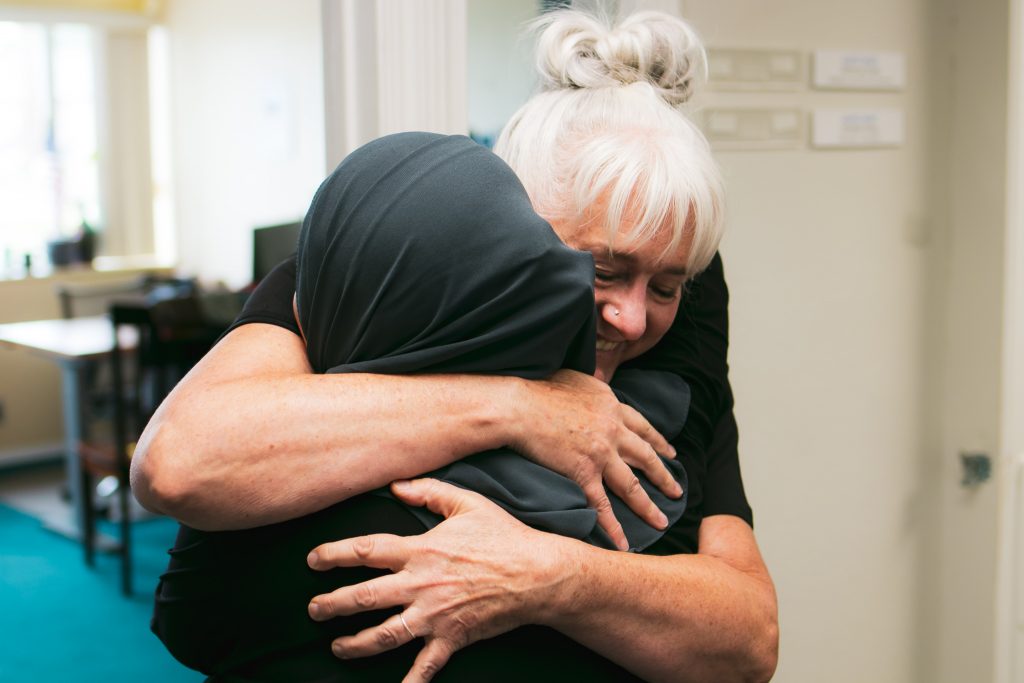
I have to start with the basics:
Who is a refugee? A refugee is someone who has had to flee his or her home country due to violence or persecution. By definition, a refugee has been invited to come to the United States and comes here legally.*
In 2021, 89.3 million people were forcibly displaced worldwide as a result of persecution, conflict, violence, human rights violations or events seriously disturbing public order.
- 53.2 million of these people are internally displaced within their own countries; 27.1 million are refugees.
- Roughly 36.5 million (41%) of the 89.3 million forcibly displaced people are children below 18 years of age. (The UN Refugee Agency)
This week, I spoke with a woman whose family fled Ukraine twenty-two years ago when she was six years old due to religious persecution. Because they were Christians, the children were not allowed to go to school. I spoke with a medical doctor whose wife worked for the US Embassy in Afghanistan, and when Kabul fell, they had two hours’ notice to evacuate. I spoke with a woman who had been a refugee her whole life before coming to the United States. They are all our neighbors.
How many refugees come to the US? A total of 11,411 refugees (18 percent of Biden’s announced target of 62,500) were resettled in the United States in fiscal year 2021. (Center for Immigration Studies)
Which countries are accepting the most refugees? 38% of the total number of refugees are hosted in just five countries: Turkey (3.8 million), Colombia (1.8 million), Uganda (1.5 million), Pakistan (1.5 million) and Germany (1.3 million). Poor and middle-income countries are shouldering more than their share of the burden.
Who is an immigrant?
An immigrant is anyone who takes up permanent residence in a foreign country. All refugees are immigrants, but not all immigrants are refugees. We will look at other categories of immigrants in future blog posts.
First and foremost, refugees and immigrants are human beings created in the image of God. They are our brothers and sisters.
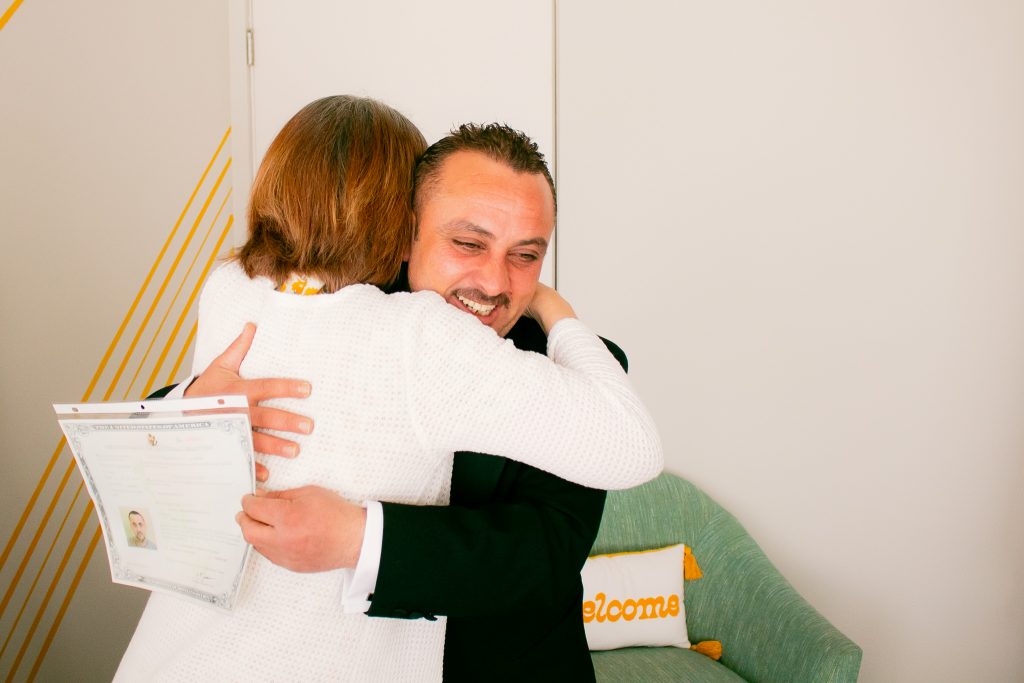
“Do not oppress a foreigner; you yourselves know how it feels to be foreigners because you were foreigners in Egypt.” Exodus 23:9
“Immigrants today, whatever their manner of entry, come primarily for the same reasons that immigrants have always come to our country. Though immigration policies have changed quite drastically over the last two centuries, immigrants themselves are still pushed out of their countries of origin by poverty, war, and persecution, and are still drawn to the United States by promises of jobs and economic advancement, freedom and family reunification. These push-and-pull factors explain most, if not all, of immigration to the United States from the time of the first settlers to today.” (Welcoming the Stranger, p. 45)
For most of us, the idea of being forced from our homes or prevented from going to school or church or the market, the fear of being kidnapped or killed, or receiving notice that we must be evacuated within hours are so far removed as to seem unreal, but for millions of people those scenarios are very real.
We cannot fix the global problem, but we can make our city a welcoming place for the 650 new neighbors we expect to arrive next year. And to those 650 people, it can make all the difference in the world.
Learn more about World Relief and the work we do by clicking the link here.
*Legal definition of “refugee” from the UN Refugee Agency: someone who “owing to well-founded fear of being persecuted for reasons of race, religion, nationality, membership of a particular social group or political opinion, is outside the country of his nationality and is unable or, owing to such fear, is unwilling to avail himself of the protection of that country; or who, not having a nationality and being outside the country of his former habitual residence, is unable or, owing to such fear, is unwilling to return to it.
Alexis Dubreuil: Intern Reflection
I’ve always considered it a blessing to have been raised in an environment that exposed me to different types of peoples and cultures. I am one of a lucky few to have this blessing; the potlucks at my churches always presented a beautiful array of food originating from the Middle East, Southeast Asia, the Caribbean, and South America. I prided myself in knowing that I was never truly a victim of culture-shocks—embracing and celebrating differences was natural— exciting, even.
Additionally, as a French major and an International Studies major with a political science emphasis, I have spent the past two and a half years delving deep into the histories, cultures, and current political environments of many different countries. I speak French and Spanish well enough to conversate. These are all things I was able to tell the Intern Coordinator at World Relief, a Christian based non-profit organization that works with helping refugees upon their entrance to America, that I believed both qualified me and made me excited for a position.
I became an intern at the Spokane location twice a week for 4-7 hours a shift under the lead Job Developer for refugees. Her job, as written, was to help connect refugees after they have settled in their first few weeks, to potential employers so that they can become self-sufficient. In my head, I imagined my job would be meeting with incoming refugees, interviewing and writing resumes with them, and connecting them directly with hiring jobs in the area. I was expecting to form relationships with the cases I worked with, and to utilize my cultural competency to navigate barriers in communication.
Scratch that.
The stress, confusion, and disarray that was the U.S. removal of troops from Afghanistan shifted my role completely. This fall, World Relief was pressed for donations, for volunteers, and with the creation of a new Afghan parolee system specifically for helping the extremely large influx of Afghan refugees, all hands were on deck. It was an extremely unique time to start working for the organization—no longer was my role to simply be writing resumes, but, as my director explained, I wore many hats.
On a day-to-day basis, I juggled many tasks: sometimes I was taking my clients to job interviews, sometimes taking them to doctor’s appointments, and sometimes picking their kids up from school, and sometimes doing all of that and then some in a single afternoon. I had to learn how to drive and park a ten-seater van during my time there so I could help drive big families. My supervisor was amazing, and believed in the relationships formed more than just the bare minimum of the job, and wanted the same for me. I met with clients, but I also went to their houses, I brought their kids toys, and I helped them move to different apartments.
Forming these relationships could not have been more rewarding. Although knowing Dari, Pashto, Vietnamese, or Swahili would have been much more useful than French, I was able to connect to Francophone clients in a way that my coworkers could not. I became close to one of my clients from Congo, a young mother with four kids. Getting to know her and her kids was a highlight of my internship; seeing how she cared for her kids and engaged with all of the resources World Relief had showed her ambition to build a new life. It is so obvious to me that refugees in America are driven and intelligent. It is beyond me how anyone could claim that refugees and migrants have nothing to contribute when they are the people that seize every opportunity to build this country up.
However much joy there can be with working with refugees, working with people exiled from their country also requires a lot of sensitivity. Sometimes clients would share, sometimes they would not—seeing refugees not just as people immigrating, but as people that have had their lives completely changed (for many, in a matter of days), calls for empathy from the staff.
A client walked in one morning to speak with my supervisor, and was telling me a bit about the Taliban activity in his village far from Kabul. He showed me pictures of hundreds of Afghans standing in a plane, packed like sardines to get to America. Afterward, he told me about his family that had to escape to Kabul where they would not be identified as being associated with him at all. This was because he drove trucks that transported goods to the US military as work. I was in charge of this individual’s entry interview, and I remember asking him, “You’ve been here for about a week, what do you like most about Spokane thus far?” He replied, “Me and my family are safe.”
While every refugee’s story is different, most of the refugees I spoke with had stories just as intense. They made me think hard on everything I take for granted in the US. While the United States has plenty of its own pressing problems and structural issues, I have never feared for my life in the way many of these individuals have; it was a very unique time of reflection for me.
Besides the work itself, the work environment was absolutely amazing. I think the work environment is unlike any other. My colleagues embody family. They care for each other and for their clients, and it is reflected in how many clients come back to either work for, work with, or simply spend time with the staff of World Relief. They are extremely driven towards their mission, and love working with interns and volunteers. I recognize that my experience was unlike any other, and I am grateful for everyone I met and every experience I had.
As I move forward in my career, I will always think of the dedicated staff and driven refugees at World Relief.
Alexis Dubreuil interned with World Relief Spokane during Fall/Winter 2021. She is a student at Whitworth University studying International Studies and French. Thank you for being part of our team, Alexis! Click here for a list of available internship opportunities.
Stories of the Season: Former Refugee Serves on Two Reserves
Ehblu recently graduated Spokane Police Department’s reserve training. This is his story.
“My name’s Ehblu. I was a refugee. I came here in 2008, to Spokane, with my family. I was eighteen years old when I got here.
“Before I came here, I was born and raised in a refugee camp. My family, they were from Burma. They ended up in a refugee camp in Thailand. Back in 1989. The name of the camp is Maw Ker. I was born in that camp in 1990, and I lived there about 10 years. We had to relocate to a different camp – the name of that camp was Ump Hiem. We moved there in 1999. We lived there for about 8 years before I moved here. When I was there, I was just a student. I didn’t do anything. I just went to school and had fun with friends, that’s all. Didn’t do anything much.
“When I came here in 2008, they connected me with World Relief. They would help me with trying to find shelter, a house, and help me find a job. I still remember Pingala. She still works here! She helped me with finding a job. From there, way back, 12 years ago – that’s how I got connected with World Relief.
“My first job was at Spokane Valley. Spokane International Pet Rescue. There’s a lot of Karen people who work there now. I worked there about 6 months and got laid off. I stopped working, about a year. But when I stopped working, I went to school. I was trying to improve my English at that time.
“I went to the adult education center on Monroe Street for about 2 years. I started to work at Spokane Public Schools as a bilingual specialist in 2010. I was a part time employee for about 4 years. In 2014, I got hired as a full timer there, and in late 2015, I started college here at Spokane Community College. I just finished my AA this summer. It took me about 4 or 5 years. In 2017, I joined the US Navy Reserve program. Then, in 2021, I joined the SPD reserve, the Spokane Police Reserve program. We have training and a lot of classes, about 280 hours of classes. I just finished last September. This September, about 2 months ago. So I’m in both the Navy Reserve and the Spokane Police Reserve.
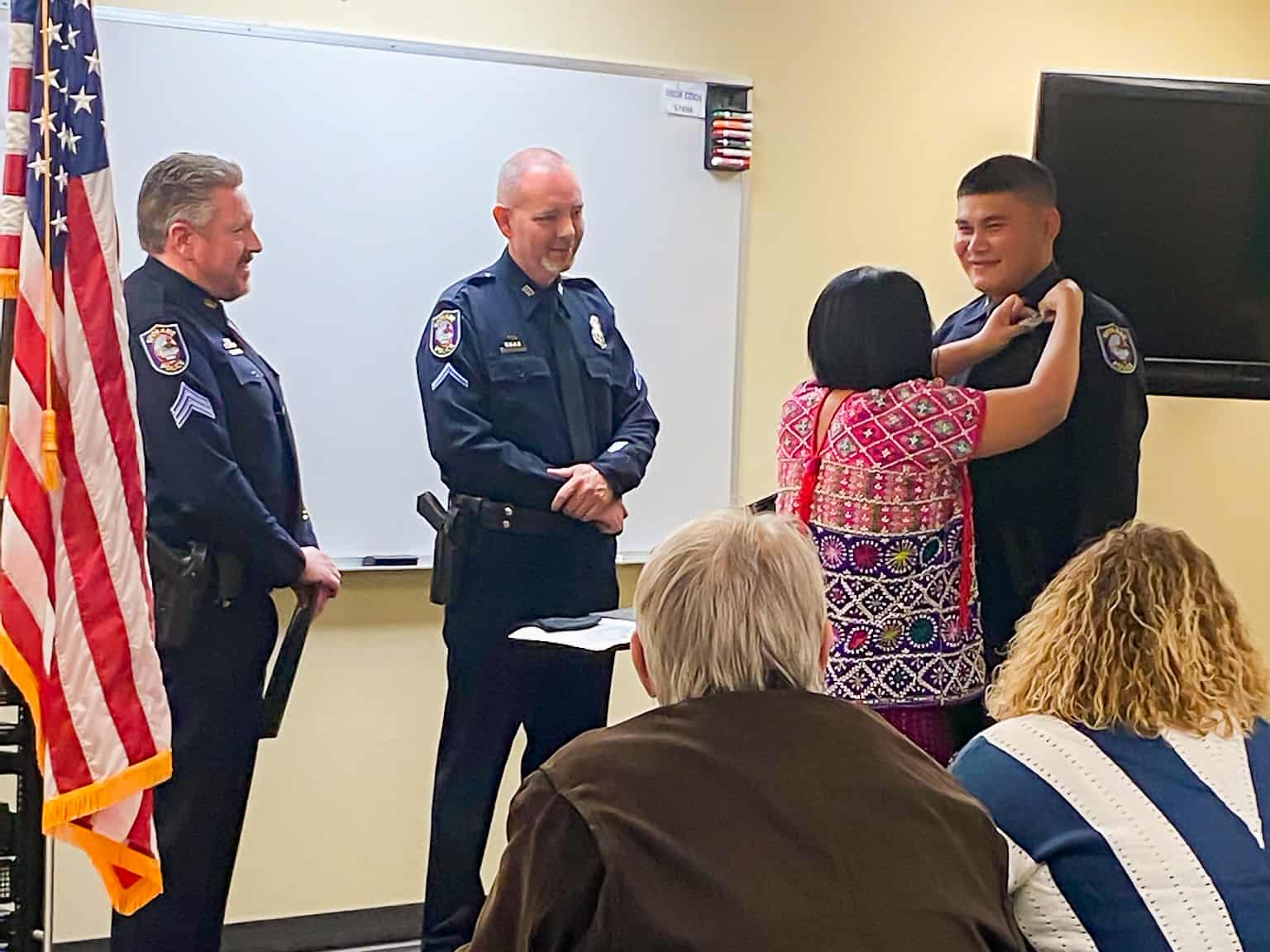
Image description: photo of Ehblu receiving his police badge from a family member at his graduation ceremony.
“The reason I joined the police officers – it’s because I came straight from the refugee camp to Spokane. The people are very nice. They welcome me. The communities are great. Spokane is part of my community now. I think, for me, it’s my responsibility to keep my community safe, and do something back for the community. Maybe to set the example for other refugee youth who came here, to show them that, hey, it doesn’t matter where you came from. As long as you keep trying, you can do anything. That’s what inspired me to do the things I’m doing now.
“To have a community, it’s about neighbors that help one another. Everyone wants to be in a community that’s safe. My family is in a safe community. Like a bad community, no one helps each other. In a good community, you feel safe to leave your family when you go somewhere. Your community has your back when you’re away from your family.
“There’s a pastor called Pastor Doug. He is the one who helped my family a lot. He helped with transportation, and with living stuff that we didn’t know. He basically helped us with everything when we got here, during the first 1-2 years. There’s a church – he sometimes take us to go to church. He’s not just helping us with basic stuff. He also helps sometimes with the forms. When we came here, we didn’t have jobs, so there’s a form when people need work. He connected us with those people, so we can earn some little money. When you need him, he’ll be there for you. I’m getting really busy with my work, and things are better now, but sometimes I still connect with him. There’s also a woman called Susan. Most of the Karen people, we also know her. She helps us a lot with stuff. We go to see her, with a lot of mail, and some food stamps and social things. She’s helping us a lot. These two help us a lot.
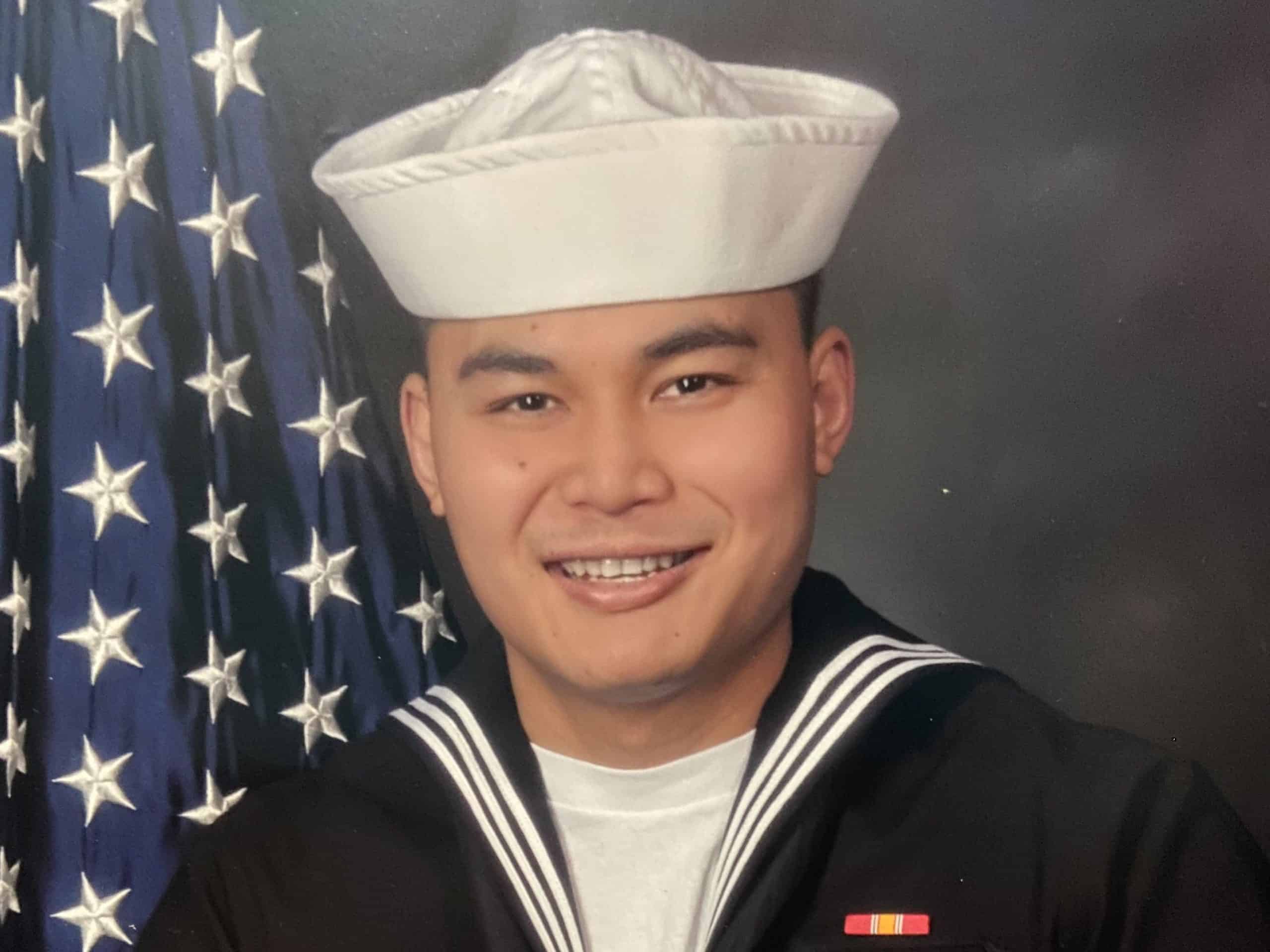
Image description: Official image of Ehblu in his Navy uniform.
“I’m still doing the Navy Reserve. I signed up for about six years. This is my fifth year now, so I have one more year. But I plan to do at least 20 years. I love what I’m doing in the Navy. Before I came here, I lived in a refugee camp. Without this country, without this government, I won’t be able to make it here. Living in a refugee camp, it was very hard to make money. Even if you have money, you might not be able to come here. Because of this government, I was able to be here. I don’t want to take things for granted, so I want to do something back for this country. So that’s why I chose to join the Navy Reserve. I didn’t have any ideas about what the Navy looks like, I had no one to talk to. But I signed up for it. And boom! It took just a little bit of time to sign up and get to boot camp and to the training camp.
“My goals keep changing. My goal is to be a social worker one day, trying to help. When I help others, I feel so happy. When I get to do something and change someone’s life, when I am able to help them, it makes me feel like I want to do some more. It makes me feel more motivated to help others.
“I did apply to go to Eastern Washington University, but I haven’t started yet. I still need to talk to the advisor. So I finished my AA here. My goal is to be able to start university at Eastern and to start to take some classes in the next year. Next month. I think you can do anything you want to, as long as you keep trying.”
Justin Li | 12/23/21
Stories of the Season: Mustaba’s Restaurant
This Christmas season, we’re celebrating the accomplishments of former refugees in our community. This is the story of Mustaba and Tantuni Restaurant.
“I’ve been in the United States five years and 2 months. I came to the US when I was 19 years old, and I started as a student in high school. Everyone told me at that time that I can’t graduate from the high school, because I only had 2 years. I started as a freshman, but after 2 years I graduated, and finished all my classes. Yeah, that was my first achievement here. It was a lot of sadness, a lot of giving up. At the same time, I thought, ‘Everyone can do it, why I can’t do it?’ If you believe in yourself, you can do whatever you want.
“I came from Turkey. I used to live in Turkey. Most of the struggles I had there, were because I didn’t know if I would come here or not. You really get frustrated there. You don’t know what’s your future, don’t know what you’re gonna do. I came here on October 6, 2016. After that, I started thinking about my life, thinking about my future.
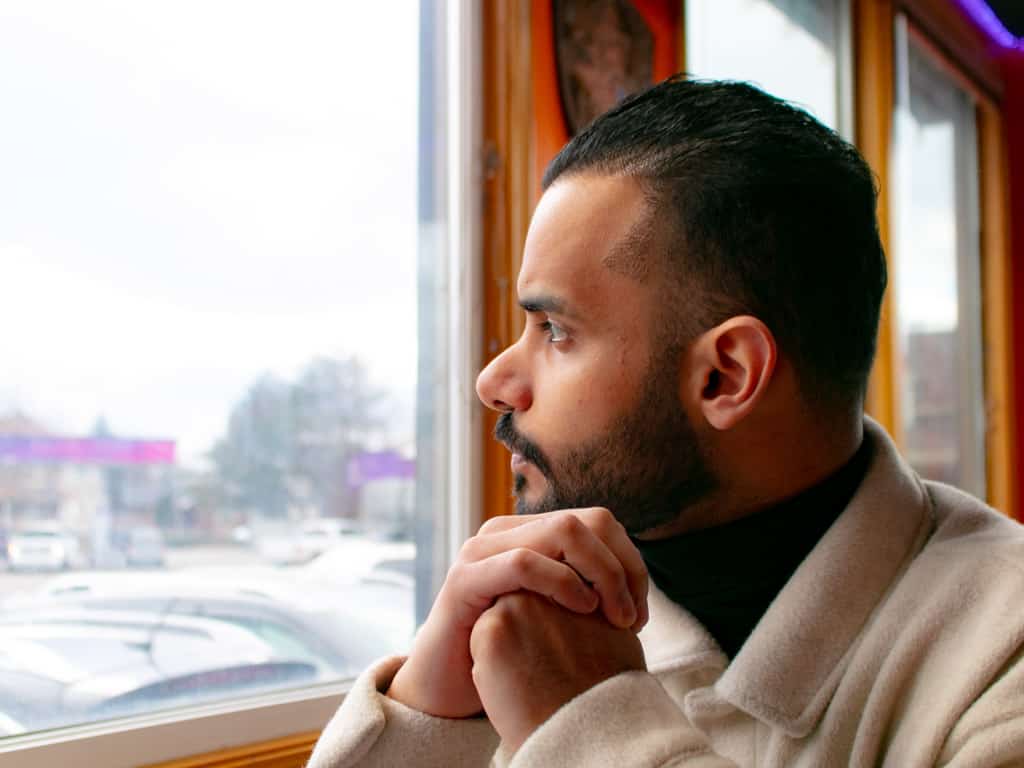
Image description: a portrait of Mustaba sitting at a table in his restaurant. He is looking out the window.
“When I first went to World Relief, they taught me about the life here, what people are thinking. I like the classes there. They teach you how to live with the other people from different cities, from different worlds. They’re all thinking you’re a human, and they’re just thinking everyone should deserve a better life. Which is what I like about them. Whenever I went there, they would help me with a smile.
“When I got my first job here, I was working in a restaurant. I worked with Fadha. He was my manager. We used to share lots of breaks together, so we would talk. He’s from the same country, so it was easy to talk about lot of stuff, especially in Arabic. So he told me about himself. Fadha’s been a chef for 22 years now. He used to work with an American company to do a buffet, for American people. He was the head chef over there. Fadha told me a lot of stories, and he cooked for me as well, and I really liked his food. I was joking with him, I was like, ‘if I open a restaurant, I will make you my chef.’ And we were joking about it because he didn’t believe that. I didn’t believe it either. Fadha was my manager. And I really didn’t think about it.
“I always say I have two families. One is my regular family, like my parents, my brothers. My other family is my friends. In this life, you have to find two families: a family who raises you and takes care of you, and family who will support you – that’s my friends. Whatever’s happened, whatever’s going to happen, I will still have these two families forever. In the happy time, in the sad time. All the time, they were with me. I love both my families.
“My brother is from both families. He is my brother and my best friend as well. We don’t have that rivalry between brothers. When we were kids, we were like Tom and Jerry. We were fighting all the time. My brother, he’s older than me by five years. We were fighting so hard. This scar on my eyebrow, that’s from him. Today, the eyebrow scar, it’s like the models, it’s like a style. When I was 4 and he was 9, I broke his train toy. My dad brought it from India, I think. He brought it to him. And my brother was playing with it, and I just broke it. And he was mad and hit me. Now, he is my best friend and my brother at the same time. But I like to call him best friend better.
“He found a place, and we planned to open a restaurant there in March 2020. A restaurant called Tantuni. I studied everything. If you don’t know anything about the business you’re going to open, you’re not going to get anything. So I studied the people here, the ethnicities here. I studied the culture. I studied what people like and don’t like. I was going to a lot of restaurants. When I went, I didn’t want to eat. I was looking at the décor, the customer service. Sometimes, I asked people if they liked the food or not. I got ideas, and collected those ideas together. When we tried to sign the contract for the restaurant, COVID hit and cancelled everything. We’re back now, after everything.
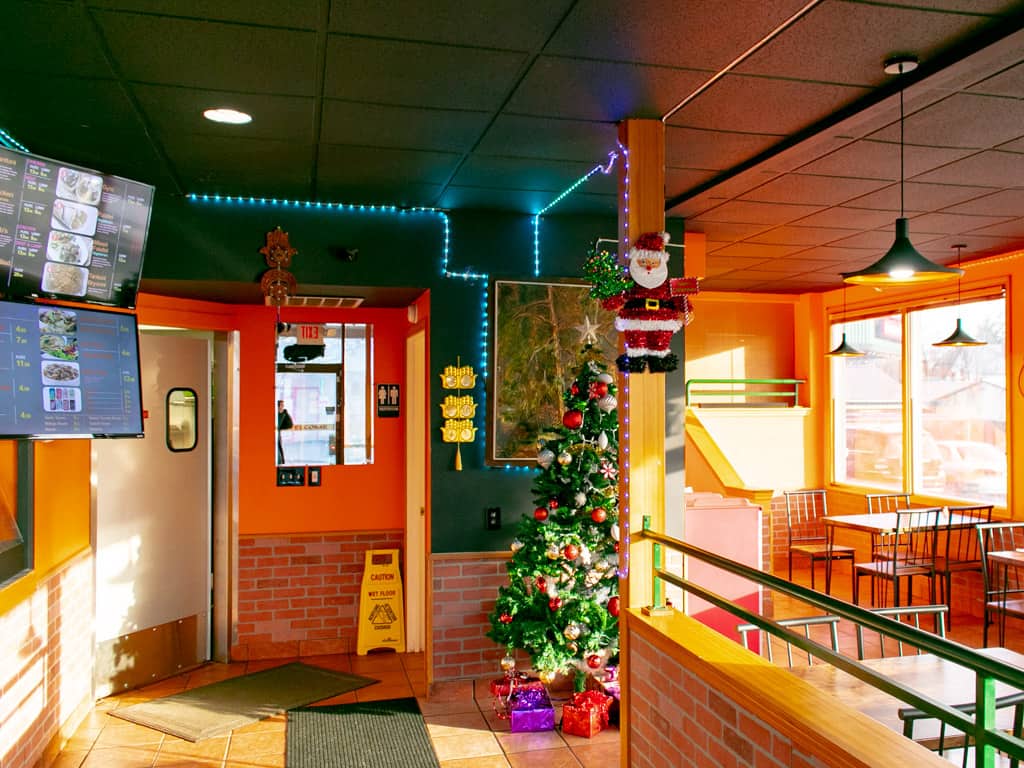
Image description: a picture of Tantuni’s newly remodeled interior. There is a Christmas tree beside the serving counter.
“My brother and I used to remodel houses before we started Tantuni. From our experience remodeling, we remodeled all the restaurant all by ourselves. Everything here is by our hand. The lights, the pictures, the TVs, even the logo. It was our idea. We went to the guy who did logos and said we want something like this. We gave him the idea, and he just drew and made it for us. We brought our ideas together. The colors, my brother picked the black color and I picked the orange. Even the décor we had ideas together. We did everything together. Our friends helped a lot. Hussein, and Mohamed, and Tito. They helped us open this restaurant. I called Fadha, my old manager, and I told him, ‘Hey, I’m opening a restaurant called Tantuni. Do you still want to work with me?’ And he laughed, because he thought I was joking. When he met me and my brother, we agreed about everything. Fadha’s our chef now. I still can’t believe that.

Image description: a photo of Mustaba posing with the sign for his new restaurant, Tantuni.
“It’s just the beginning. I don’t want to do something and leave it in the middle. I’m not stopping when people say you got success, you did a great job. It’s not a great job for me until I see Tantuni as a brand, like the fast food chains. A better brand. The idea of opening this restaurant, I wanted to make it a mix between fast food and cuisine food. Cuisine is fresh food, delicious food, and cooked right away. And fast food, the order is going to take 10-15 minutes at most. I just want to show the people, it’s fancy fast food. When people come here, they’ll trust me about what they’re eating. That’s what it’s all about here. I don’t want to make money, I want to make customers.
“My brother’s in Turkey now. He got married, and he’s waiting for the consulate in Ankara so they can meet his wife and he can bring her here. He’s just waiting there. I’m praying for him every day. So he can come and see what he did. He was here when we signed the contract for the restaurant. But he left 2 weeks before Tantuni opened. He can’t see what we do until he sees with his own eyes. Even if I told him everything for 24 hours, it would not feel right until he sees with his eyes. Hopefully, he’ll come soon. “I got a lot of ideas. I like to think differently than other people. I like to be unique in my thinking, in my ideas. I like to be positive all the time. You’re only going to live one time, this life. If your mentality and mind are set up for positive thing and happiness, if you like to see people happy, you’ll be happy as well. I just hope everything will be fine in 2022, and all the people will be safe and happy. That’s what I wish for. But what happens in the future, let’s just keep in the future. As my dad says, ‘Don’t think about the future, make it.’ Whatever you want to do, whatever you’re going to be, make it by your hand. Nobody’s going to come to you and say, ‘Oh, you want to be a doctor? I’ll make you a doctor.’ I want to finish my dream, to be an engineer. I wanted to be a petroleum engineer. But I think in the future, the petroleum will be all gone. The world will need new energy. So I believe electrical engineering will be the best path for me. No one’s walking with a magic stick to make your wish a reality. If you want something, make it happen.”
Justin Li | 12/20/2021











